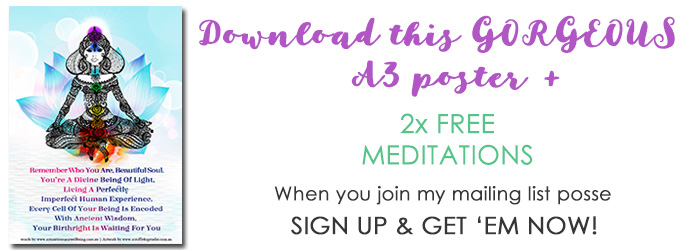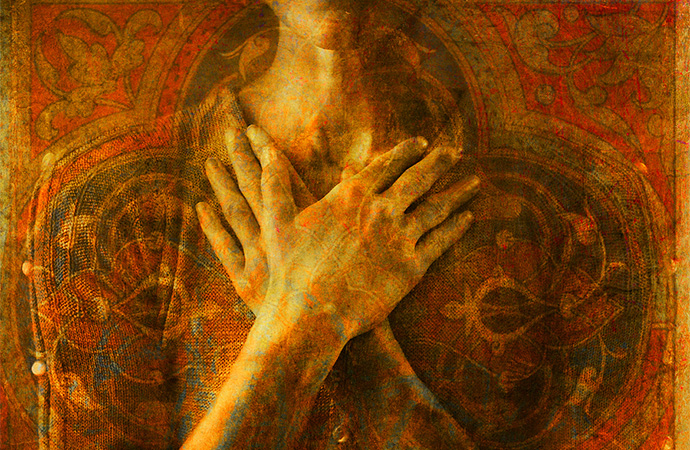Okay, so Part I of this piece included a lot of preamble. But I wanted to make sure I explained where I was coming from.
As in… I used to have a debilitating autoimmune disorder, and now I don’t. I used to live a life embedded in coping with trauma and a great deal of negative self-talk, now I don’t.
So I’m talking from a lived-through-it perspective.
That said, what works for one person won’t necessarily be right for another.
However, the most telling thing in my own experience of healing my health and emotional trauma is this: since I started my Kinesiology studies, I’ve never had more than a headache in terms of illness.
When I was diagnosed with Hashimoto’s, I could barely get off the couch. I’d regularly be hijacked by the zombie-like overwhelm of brain fog, hyper-sensory awareness and a myriad of other symptoms.
One of my neighbours (bless your lovely heart, Bree!) would cook dinner for me several nights a week because I didn’t have the energy to do it myself.
These days I’ve actually been able to ween off thyroxine completely and now I maintain my health with good quality supplements, Kinesiology, yoga and meditation.
What Sarah wrote about was specific to her own experience, but it’s spot on
Chronic illness CAN be triggered via untreated, ongoing self-hatred.
But NOT just self-hatred…
It’s about our stories. How we choose to see the world and ourselves. And the sneaky hidden sabotage patterns that can make change feel like an impossible struggle.
For sure, healing isn’t as simple as telling yourself “I love you” and getting plenty of facials. No one’s suggesting that!
A few thoughts in response to snippet’s of Sarah’s article…
When I’m asked, though, “What caused your disease?” I have to be frank and say… everything points to… anxiety. Or as I like to put it, a profound, visceral, itchy dis-ease with myself.
That’s a fabulous awareness to have.
When all’s said and done, the underlying lack of ease in our Selves can lead to serious illness.
For those who find this idea hard to comprehend… let’s look at the impact of stress
Most of us know being stressed can lead to illness, right?
Whether it’s due to over-work or not getting enough sleep, stress eventually wears us down. And hey presto, we get a cold or flu.
So, it’s not a major leap in logic to understand that ongoing, chronic stress creates ongoing chronic illness. Yeah?
Stress = an emotional and physical response which causes inflammation.
And inflammation in the body is well-documented as being linked to illness!
When chronic stress remains unresolved, we can get REALLY sick (i.e. anxiety, depression, AI diseases).
And guess what? These ideas on health and wellbeing aren’t new. They’re ancient. It’s just that modern people have managed to get things all turned-’round.
Note: Not everyone will get sick to the same degree from stress, and not everyone will develop the same kind of illness. Like health, illness manifests differently in different people. For example, it can also look like chronic “mystery” pain, eczema, psoriasis, acne, IBS etc.
Illness is what happens when women, the nurturers of humanity, forget how to nurture themselves.
As some of Sarah’s readers have pointed out, AI affects not just women. But yep, the majority of AI sufferers ARE women.
However, this principal works the same way for men and other dis-eases in addition to AI.
Nurturing ourselves matters!
However, it’s not JUST about nurturing ourselves…
Illness comes from forgetting who we really are, and living out of alignment with our hearts.
Remember – most of us understand that too much stress can mean we might get a cold/flu!
And stress comes from over-doing, or living out of alignment with what’s best for us.
Illness is your body’s way of saying… something REALLY isn’t right here, please pay attention!
How many people do you know who are flighty, scattered or addicted to drama? They’ve lost their resilience, the ability to nourish and nurture their soul through the ups and downs of life.
Yep. This is connected to both a societal and personal cultural shift towards goals and values that are perceived en-masse to be important, but which mightn’t be aligned with you personally!
Which is part of what I mean when I say “we forget who we really are”: We’ve learned to look outwards instead of inwards for satisfaction.
There’s more to it than that, however
As humans, we tend to forget we’re not just bags of skin, bone and blood and muscle. Every part of who we are is a part of this Universe; the creative forces that brought this planet and every other celestial body, into being.
And yet… we’re taught to value money and possessions and cars and houses and a fabulous wardrobe and fancy holidays.
These, we’re told, are the signs that we’ve “made it”.
Do y’know what isn’t considered equally important (and should be)?
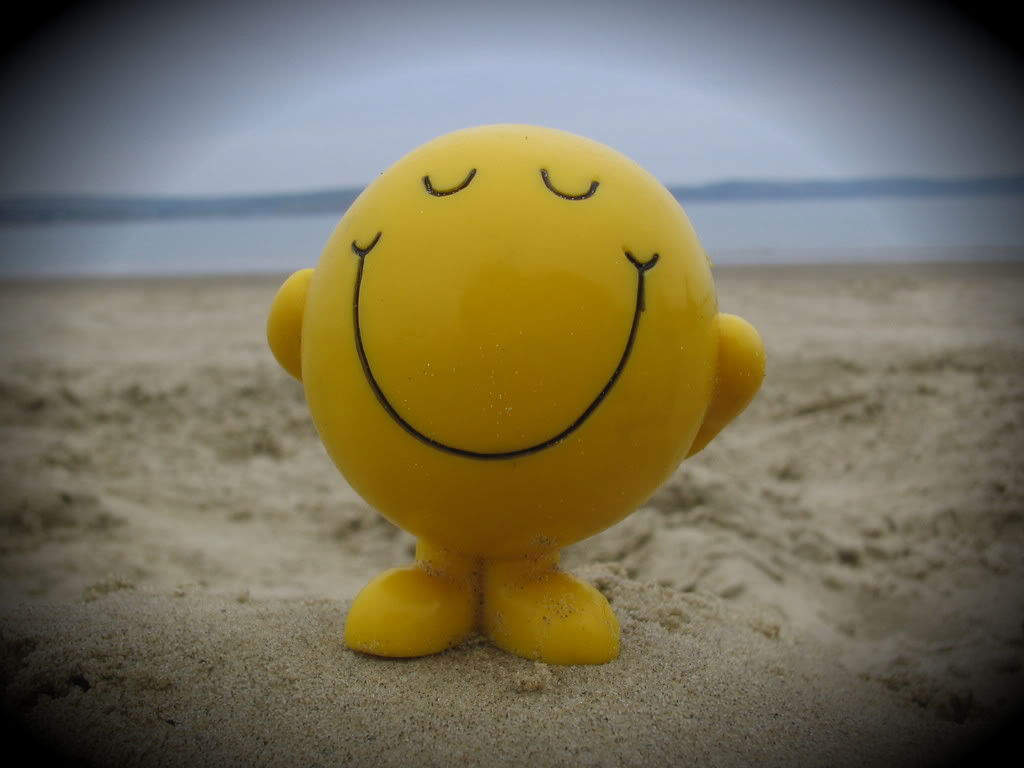
Happiness. Playfulness. Being connected with your Higher Self. With other people.
Knowing your heart and feeling empowered to speak freely. To say what it is that you need in order to feel balanced and happy. Self-respect, and respect for others.
These are the things we should be teaching our children as part of the school curriculum. And we don’t.
Okay, unless you’re a hack-schooler like this amazing young man… It’s a TED talk. Watch it!
My take is this: not constantly doubting and putting the breaks on emotions, innocently and authentically responding to things, being able to cradle and accommodate our own (sometimes extreme and erratic etc) emotional responses rather than relying on external things (other people, drugs, gurus).
Early in my Hashimoto’s diagnosis, I was a jumpy nervous wreck, living with hair-trigger anxiety that could be extremely physically painful at times.
In an attempt to explain this to people, I’d tell them “it’s like my stress response is broken“.
Once my stress response was activated it could take DAYS to turn it off again.
Unfortunately our culture and lifestyle is such that anyone whose stress response is broken, does not generally find relief when venturing outside their home.
Lately in Melbourne I’ve noticed that if you’re at the front of the queue at the lights and you DON’T take off like a bat out of hell the very moment the lights turn green, someone’s all too willing to beep their horn at you, before you’ve had the chance to blink.
It’s like we’re stuck on the idea that hurrying, doing more in less time, and thriving on stress means we’re better/stronger than others.
But in fact, it’s a darn good way to run your battery flat
We’re constantly putting women up against standards they can’t possibly meet. When you can’t be the ideal wife, mother, girlfriend, teacher, cook, church volunteer, corporate executive and activist at 20 pounds below your healthy body weight, what’s left but to silently (and subconsciously) hate yourself because you’re not perfect?
Again, this isn’t true just for women. But yes… All of that “do/be more more more”, leads many people to reflect inwardly that they’re just “not good enough“.
I can’t count the number of competent, creative and talented people who’ve told me they feel this way. It used to be one of my stories, too.
As a result, we lose faith in our abilities and talents. We go outside of ourselves trying to live up to other people’s goals, standards and ideals.
And, if we’ve also got deeply ingrained stories from our childhood, core beliefs we learned from our parents or grandparents, or trauma we’ve inherited from our ancestors living in our cells and DNA?
Then we’ve got a toxic cocktail of deeply held messages, that insist we kind of suck.
It starts young for most of us.
And it’s insidious because sometimes these stories of self-hatred/not good enough, run so deeply, we consider them to be undeniable truths about ourselves.
Yep, we actually BELIEVE our stories are real!
That we’re too much of this, not enough of that. That we need to play small to feel safe. That the only way to be liked and part of the group is to do our best to fit in.
Only… did you ever see this TED talk by model Cameron Russell? Watch it.
Fact is, almost EVERY person alive notices their flaws before anything else, and many never acknowledge their positive qualities.
Self-hatred causes autoimmune disease, which, boiled down, is the body attacking itself.
Darlin’ hearts, instead of taking this to mean that Sarah (or anyone else!) is blaming the sufferer, think of it this way…
We INTERNALISE the attack in the form of toxic attitudes to ourselves
We wake up in the morning and stare at our face in the mirror. I look awful, we think.
We’re running late for work and berate ourselves with: I’m so stupid, why didn’t I leave earlier?
We grew up in a household where both parents and maybe even both sets of grandparents had a long-standing self-hatred war going on. Perhaps they even took their self-hatred out on us (we often project our stuff, right?).
We play these poisonous stories internally on repeat til they become a part of our reality.
Maybe we even feel like it’s the “story of our life”, and it’s always been that way?
Whether we’re aware of it or not, our attention is firmly directed towards what we think is true of ourselves AND we also ignore any evidence to the contrary.
Important to know: Telling ourselves crappy stories about who we are is definitely NOT aligned with our heart.
And those stories? They make us feel sad, panicked, distressed, worried. Stressed.
Okay! Maybe it doesn’t happen that way for everyone but so far, every person with AI that I’ve spoken to can relate to this on some level.
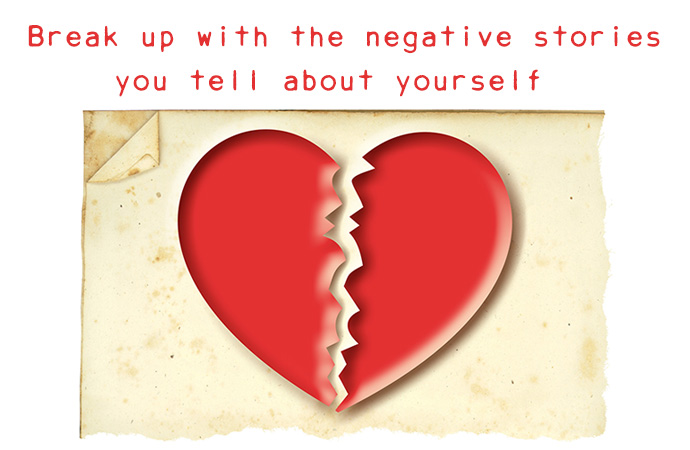
So how to heal? With self-love. I rarely know what this means and it mostly seems a bit “motherhoody” to me. But I can see how key it is. You can do all the tests, elimination diets and treatments you like, but, boil it all down, there’s always a sneaking feeling that it’s more than the gluten or the toxin or the hereditary predisposition. Right?
Self-love is actually about ACCEPTANCE
Of who we are, where we’re at, and how life is. That we’re enough.
That all of us humans are in the same boat – this experience of life. That showing kindness and compassion towards ourselves/others is not a sign of weakness. That in fact, it’s divinely human.
Sometimes I sit and really feel what’s behind a flare up. The only feeling there, behind the pain and shitiness, is a cringy, self-flagellating, forward-lunging anxiety. It’s always there, whatever the flare. The same feeling.
Yup. None of us is immune (pardon the pun!) to feeling less than awesome about ourselves from time-to-time.
The tricky thing is that when we’ve internalised that sense of self-flagellation, we become our own worst enemy, judge, juror and executioner!
And over time, this wears us down.
Stresses us out. Causes us to feel disconnected from who we really are.
Given enough time and enough spiralling and unchecked self-hatred/anxiety etc… illness can be the outcome.
Without getting too yoga philosophy-ish on y’all…
This description of discomfort in life is what’s known as the condition of human suffering.
To summarise: When we experience ourselves as separate and cut off from the world/the Universe – as if we truly are alone inside of our skins – then we feel “not enough”. That something’s missing and yet we can’t put a finger on what that thing is… However, the only thing that’s truly missing is our awareness of the bigger picture of ourselves as 100% a part of this Universe. You, me and everyone/thing else on this planet.
As a friend and colleague of mine likes to say… there’s really only one of us here. As in, we’re all a part of the whole. The Universe. Collective Consciousness.
Unfortunately our culture enourages that sense of suffering and separation, which is how we end up buying all kinds of things we don’t want.
Including crappy stories about ourselves!
Recently, I had a client who’d achieved ALL of her goals in life to date
She’d “ticked the boxes” of travel, study, and getting her dream job. All by the age of 30.
Only, she realised once she got there, it wasn’t where she wanted to be at all.
Sound familiar?
A lot of people get “stuck” at that point
The whole “not wanting what we’ve got” zone.
Feeling guilty because what we thought would light us up, no longer does. So we give ourselves a hard time for being so flighty or not being grateful or whatever.
Many people just stay in those high paying jobs because that’s what we do here, yeah? Next steps: get married, a pet, a house and some kids. Job done, right?
Unless of course, that’s not what you really want. What you were put on this earth to do. In which case, it can be TORTUROUS attempting to live a life that other people say is a good one, only to hate every moment of it and hate yourself because you don’t love it.
And every day, you eat your food and carry those stories of self-hate and dissatisfaction with you. And you eat that, too.
Deeply felt discontent that isn’t addressed, never just vanishes: it festers.
In some ways the solution is really much simpler and life-enriching than constantly seeking a cure, a fix.
Well, yes and no. 🙂
What we’re talking about here with this kind of healing is clearing emotional issues that’ve been affecting our lives for a long time.
Some of it clears quickly and easily, while other stuff has many more layers, and so it takes longer to unwind.
It requires honesty, commitment and a willingness to be vulnerable. To not run away from change and growth.
And it takes time to be ready for this sort of work.
As a Kinesiologist this is EXACTLY what I do
I’m a facilitator of change.
I help my clients figure out what’s going on for themselves – and together we shine the light of awareness into areas of their Being that feel stuck or trapped or lost or sad or… whatever it is.
Once people begin to see those crappy stories for what they really are, and with the support of Kinesiology… amazing shifts and changes are possible.
And of course, this is the work I’ve done for myself, and continue to do.
Clearing all of that emotional shizz?
It’s the BOMB, if you really want to reclaim your health and wellbeing.
Much love,

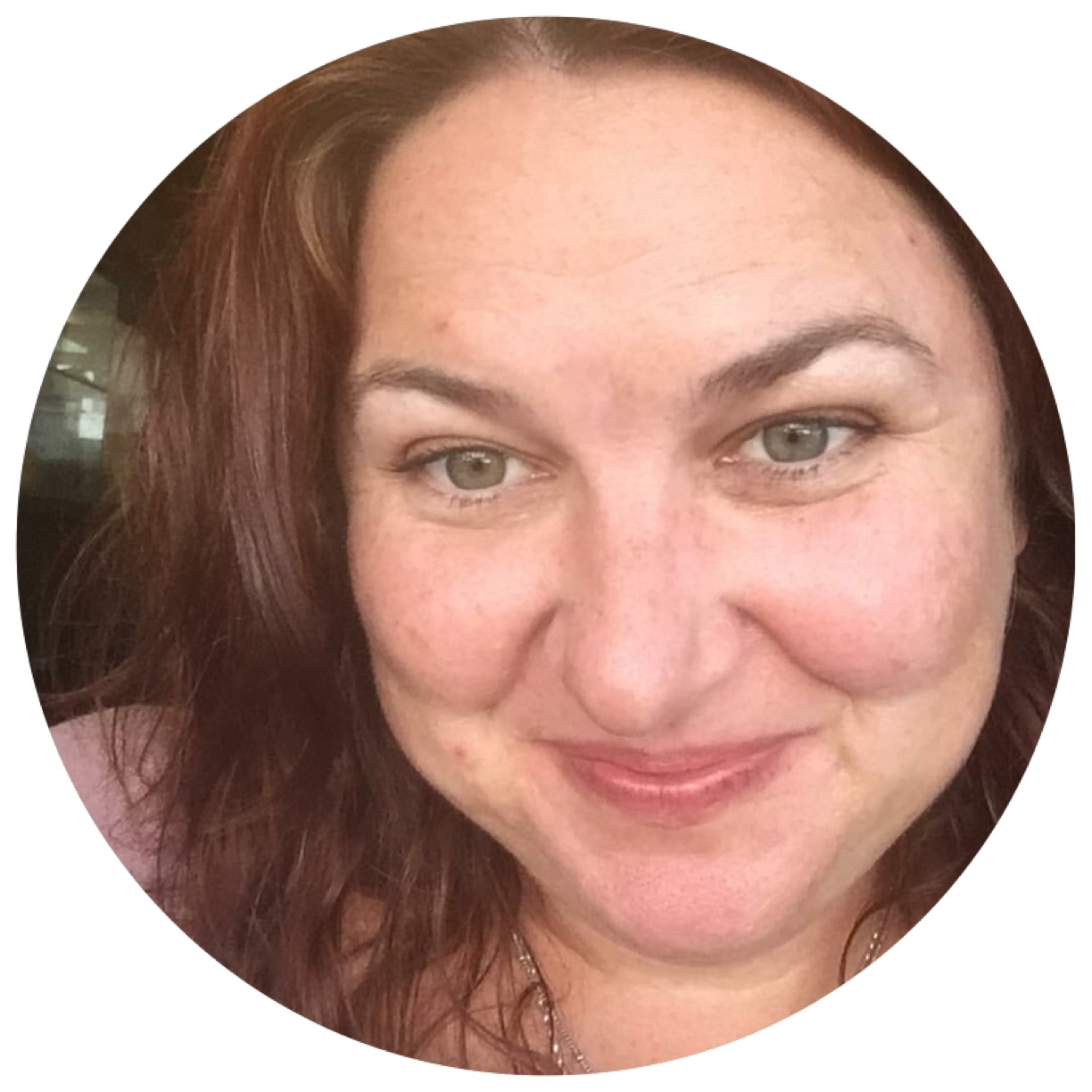 |
Ambha Amanda Roberts is a Kinesiologist, Intuitive Healer, educator and facilitator based on the Sunshine Coast, Australia. She offers Kinesiology sessions both in-person and via Skype/Zoom all over the world. Ambha Amanda is the co-creator of Adventures of Staria, which includes a series of Staria cards, and an upcoming book for children (including inner children). |
